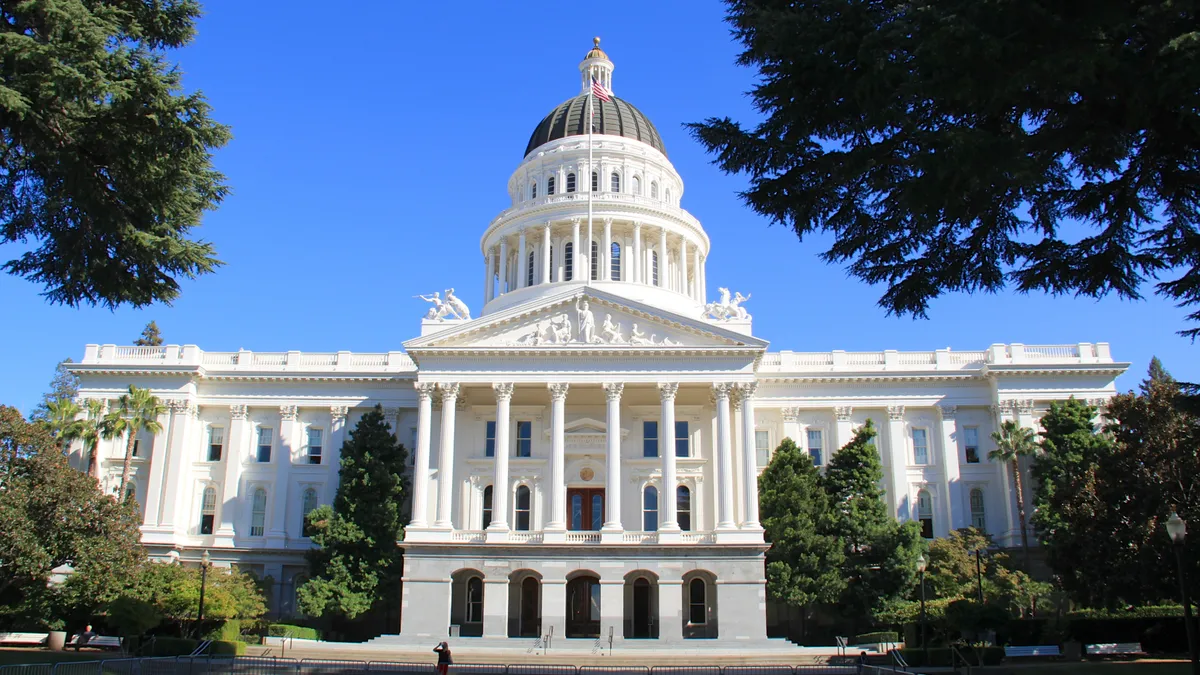Dive Brief:
- The punch is largely gone from a package of bills designed to raise scrutiny of for-profit colleges in California, the result of a successful lobbying effort to blunt its impact, CalMatters reported.
- The for-profit and online education sectors spent about $800,000 lobbying state lawmakers in the first half of 2019 in an attempt to bat back legislation that would require, among other things, the state attorney general to verify for-profit-to-nonprofit college conversions and to sign off on the sale of a nonprofit college to a for-profit firm.
- California's rules would have been the toughest yet on for-profit colleges — with other states considering similar moves — as the U.S. Department of Education attempts to ease federal oversight of the sector.
Dive Insight:
California's higher ed oversight has been in the spotlight in recent months. This summer, the federal aid eligibility of around 80,000 residents attending online, out-of-state nonprofit colleges was threatened after the Ed Department found California out of compliance with new rules for how states should handle students' disputes with those institutions.
The issue stemmed from a lawsuit by a teacher's union requiring the Ed Department to implement Obama-era rules for handling consumer protection complaints — a few months before new rules that mitigated the issue were expected.
California responded by developing the formal complaint process required in lieu of joining the primary reciprocity agreement to ease education compliance across state lines.
Although California's solution presented "compliance challenges" under current rules, the Ed Department said it would pass muster with its forthcoming state authorization rules and therefore signed off on it.
In a recent blog post discussing the stymied legislative crackdown as well as the financial aid lapse, ed tech consultant Phil Hill explained that California is grappling with how to regulate changing and emerging areas of higher ed while protecting students. "[H]opefully the financial aid snafu this summer is leading legislators to better understand the stakes involved," he wrote.
Hill is among those taking issue with the package for how strongly it targeted the for-profit and online education sector. Other pieces of the proposed legislation that have since stalled include reducing the share of revenue that for-profit colleges can get from federal and state aid from 90% to 85%.
The Century Foundation's Robert Shireman, a staunch critic of the for-profit sector who helped write the California bills, told Inside Higher Ed in July that they "were desperately needed to fill the void that the Trump administration is currently widening."
Changes in the online education space — including for-profit college operators becoming ed tech service providers for converted nonprofit spinoffs — and the Ed Department's moves to ease for-profit regulation has spurred other state-level moves attempting to raise scrutiny of the sector with varying degrees of effectiveness and promise.
Earlier this year, New York lawmakers rejected Gov. Andrew Cuomo's plan to tighten up regulations on for-profit colleges. And legislators in Maryland, Maine, Oregon and Washington, have put forward bills designed to increase oversight of the sector, The Washington Post reported, noting that interstate reciprocity agreements could limit any one state's autonomy in regulating online for-profits.













